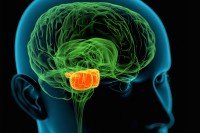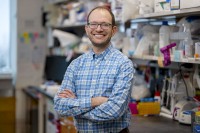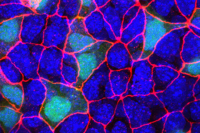
Article
Read about a discovery that a gene linked to pediatric cancers may play an essential role in normal brain development.

Thetis cells, a class of immune cells first described by MSK researchers in 2022, play an essential and previously unknown role in suppressing inflammatory responses to food, a new study finds.

In the Clinic
A new drug delivery method could improve treatment of a lethal pediatric brain tumor called diffuse intrinsic pontine glioma.

Learn about a possible new treatment approach for soft tissue sarcomas.

Learn how MSK researchers are investigating the use of nanoparticles to carry drugs across the blood-brain barrier.

By sequencing the entire genome of a tumor, the experimental test will go beyond standard testing for common cancers in adults.

Finding
The largest study of its kind to look at data from children with cancer finds inherited cancer genes are more common than expected.

The US Food and Drug Administration (FDA) has approved the drug naxitamab (Danyelza) for the treatment of patients with high-risk neuroblastoma. The drug, also known as humanized 3F8, was developed by researchers at MSK Kids, the pediatric cancer program at Memorial Sloan Kettering.
Finding
New research focuses on clonal hematopoiesis, an age-related blood condition that increases the risk of blood cancer.

In the Lab
A protein detected in the urine of children with Wilms’ tumor led to the development of a test to improve diagnosis and treatment.

In the Lab
A new study in flies reveals a previously unknown type of cooperation at work in muscle cells.

In the Lab
A large study that analyzed nearly 120,000 cells in a developing mouse embryo is full of surprises.

Feature
Learn how the Pediatric Translational Medicine Program at Memorial Sloan Kettering is bringing together experts to make new discoveries about pediatric cancer.

Finding
Researchers have found that the genetic changes that cause pediatric leukemia are different from those that lead to leukemia in adults.

In the Lab
New drugs are being developed that target part of the process to make proteins.

Science Byte
A new strategy for treating pediatric cancers involves preventing cells from repairing their own DNA.

Science Byte
MSK researchers shed light on the signals that determine the fate of embryonic cells.

In the Lab
Researchers have discovered a genetic mechanism that may trigger most childhood cancers.